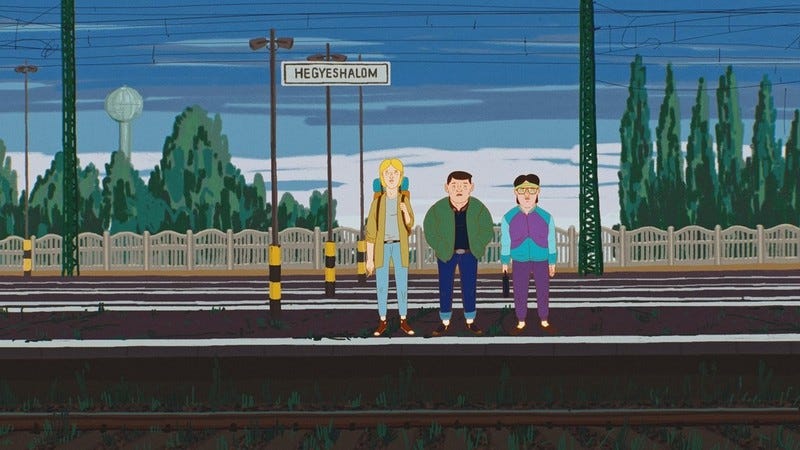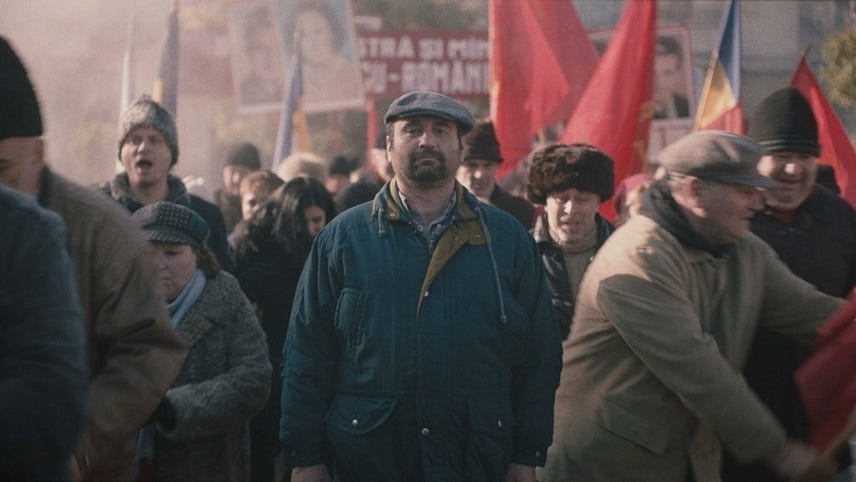I recently had the pleasure of attending the “Films of our Neighbours” (Kino Susid), a Visegrad-funded film festival in Uzhhorod, showing films from Poland, the Czech Republic, Slovakia, Austria, Hungary, and Romania (though some films were actually, themselves, multinational projects). This is a yearly event, and you get to watch some films even inside Uzhhorod castle, and it’s totally free! They also had discussions, Q&As, kids’ events, and more across four days.

The films I managed to catch were: Pelikan Blue, a Hungarian film, based on interviews, but animated, which tells the story about guys who forged international train tickets for poor students from 1989 to 2001, a collection of short films put together, DJ Ahmed, a comin of age, very watchable film about a 15 year old in a very conservative, Muslim community in Northern Macedonia who tries to find escape through music, The New Year That Never Came, a tragicomedy Romanian film set in the last 24 hours of the dictatorship, with separate, overlapping lives of different people, and Waves, another, mostly serious but occaisonally darkly funny film about Czechoslovak Radio in 67–68 and the Warsaw Pact invasion. Some were bigger, some were small, but all served well to share the art and culture of neighbours for free, break down barriers, and find commonality.

Note, you may anticipate very dry, sad, or dark films. Actually, no, they’re all perfectly blending the line of serious and humorous, showing the absurdity of life and human nature in sometimes hopeless circumstances.
Some of you, especially anyone from said countries, may already be familiar with these films as Waves is the second-highest-grossing film from the Czech Republic of all time, and The New Year’s That Never Came was also a huge success in Romania. But many of you will have never heard of these films. Yet, I highly recommend all the films I saw, especially if you’re interested in both the communist and post-communist periods of Central and Eastern Europe.
Now, I will talk about some key observations from these two films, New Year and Waves, that foreigners can benefit from understanding. Both films overlap in themes, and I think they can help you understand some components of life that live on in many former communist countries.
The Fear
Both films have significant components focused on the Secret Police of the respective countries, informants, being forced to inform, and the general fear and mistrust this sows. My wife, in fact, asked “When you watch these films, how do you perceive it when people talk about..the party, doing what you’re told…for us this was normal, and it’s why we in Ukraine are often the way we are” and I replied “Well, I know about this objectively. But, ultimately, I can never understand how it must feel to be coerced to collaborate with government agents, to have to do things because you were told, to be afraid of what you say to someone else” to which she replied “this is why many people in Ukraine can still, sometimes be suspicious of strangers, because you never knew who anyone really was”
Thirty years of recovery is not a long time, it is true, and this suspicion, certainly among older generations, is still present. We couldn’t get a neighbour to sign a petition out of fear. These films are ways to show both younger generations, as well as foreigners, how the threat of violence against you, or worse, your loved ones, was everywhere, ears were everywhere, and you couldn’t trust a soul. Even your family.
Importance of Free, Accurate Media

Another component of these films that I think foreigners should be aware of is the power of free media. In New Year, a problem is that many people do not get accurate information about what is happening around the country, only those who are able to access Radio Liberty and the like. In Waves, a film all about radio and freedom of speech, the struggle is the meddling in the radio to promote propaganda, and the fight back, and how this, in turn, generates reactions from the government, and even some citizens. For many people, they were unable to access accurate, or at least not communist media. Even if most people didn’t believe it, they didn’t know what to believe.
First, this can directly relate to apathy in Russia today about everything there, even to an extent in Ukraine regarding certain matters (the cynicism about COVID measures, for example, was a good example of people distrusting the state here). Doesn’t that sound worrying familiar or many western nations now, though? State meddling in the media? People unable to tell truth from fiction? These films, in a way, could be seen as warnings. This isn’t history. It’s reality.
How Collaboration Works
In fact, the films both seemed to serve as glimpses of these periods but also warnings on how freedom can be won, and lost, sometimes in the matter of a day, and what tyranny looks like.
In both these films, it is not the true believers who you need to worry about so much. It’s those who will go along with whoever is winning to survive. In a way, is it not a rational choice? In the short term, perhaps. But these people will sell you out in a moment. And the fact that it is understandable, in terms of motivation, shows just how authoritarianism can take hold. You can tell yourself you’re a fighter, but, when they threaten your spouse, children, friends, lovers, what would you do?
In New Year, there is a plot around a secret police agent, and you see the very human side. These people themselves were often coerced if not directly, into these roles, and the fact that can happen is terrifying to this day, and reminds us to be on guard against giving in out of fear, and that, if things get worse in any country, people you would never expect, can become the ones holding the guns against the people.
These films resonate with the situations in many countries right now. The threat of loss of freedom in the USA and the power the government has, obviously the authoritarian life f people in Russia, the invasion of Czechoslovakia definitely is reminiscent of the invasion of Ukraine, with claims of “fascism” and “aid” from the communist countries who mudered innocent civilians (who themselves wanted socialism, just with a human face). But, New Year has a reminder that should give everyone hope. In a day, authoritarians can fall, and sometimes, it just takes something small.

Leave a Reply